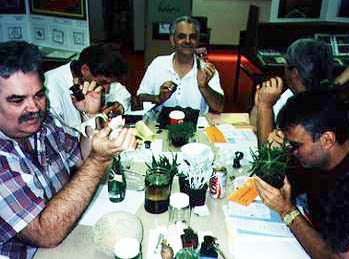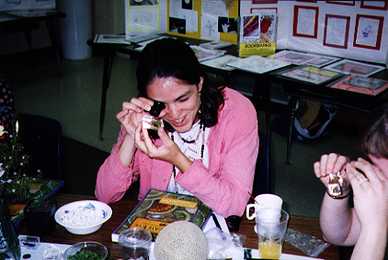magine walking into a large room that is a total interactive environment. In
the center of the room are tables for the participants to sit
at, with five to six chairs per table. Each table
is a like a field station with lots of hands-on stuff, including:
live fish, live grasshoppers, ponds, strawberries, seed pods,
flowers, plants, spiders, etc. Now around these tables
is a U-shaped perimeter made up of between twelve to fifteen
more tables. These perimeter tables are used to mount
the many display panels of student work, resource books, and
even more hands-on activities. Additional equipment requirements:
a VCR and monitor, an overhead projector and screen, and several
tables for the presenters' materials. The room should
be well lit since we will be using magnification, with natural
light a plus.
 |
Teachers using jeweler's loupes at a Private Eye Workshop |
The
site must be available for set-up the afternoon before the
schduled date; it requires approximately four hours for the
instructors to arrange the room and set-up the 450 pounds of
display and course materials. An average workshop
day begins at 8:00-8:15 with coffee and goodies (supplied by the school). The
workshop then goes from 8:30 A.M. to 3:30 P.M. There is a 45 minute to
one hour break for lunch and a short break in the morning and afternoon session.
 |
Teacher using a loupe at a Private Eye Workshop |
"Your
environment was a delight. The activities really turned
on the teachers."
— Anne
Taylor, Professor, University of New Mexico School of Architecture,
Director, Architecture and Children
"What
a fantastic day that was! Everyone loved your presentation.
Your work is wonderful."
— Dee Goldberg,
Science and Technology Resource Coordinator, Spring Branch
ISD, Houston, TX
